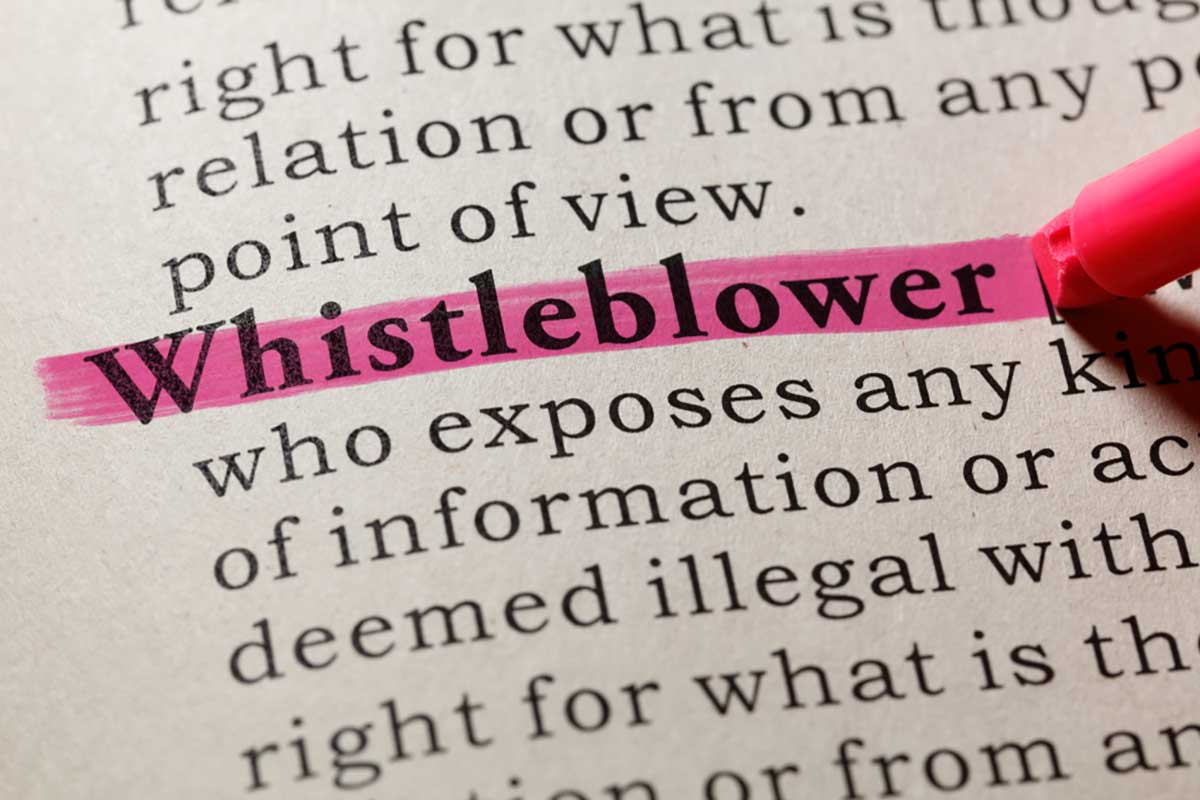Knowing how to encourage whistleblowing is essential for organisations in both the public and private sectors. It contributes to a positive company culture and helps to ensure compliance with regulations such as the new EU whistleblowing directive.
There is also a compelling financial case for uncovering wrongdoing. Corruption within EU countries is said to cost up to €120 billion every year, a figure that is equivalent to 1% of the union’s entire GDP. In the area of public procurement, the same research estimates that government contracts could cost up to 15% more than they should due to fraud and financial misconduct.
In the private sector, 37% of EU businesses said that corruption had been a problem for them in terms of trading effectively. No matter which sector you work in, encouraging whistleblowing is the key to eradicating this impropriety and creating a level playing field.
1. Why is Whistleblowing Important?
There are many reasons why encouraging whistleblowing and dealing with it in an efficient and proactive manner is important. They include:
1.1 Compliance
By December 2021, all EU member states will have to incorporate the EU Whistleblowing Directive (Directive 2019/1937) into law. This requires that organisations with 50 or more employees must perform certain actions and adhere to the two deadlines below.
| Deadline | Action |
| 17th December 2021 | Businesses and government bodies with 250 or more employees, as well as municipalities that serve more than 10,000 citizens, must put into place internal whistleblowing reporting systems. |
| 17th December 2023 | Businesses and government bodies with between 50 and 249 employees must put into place internal whistleblowing reporting systems. |
1.2 Higher Employee Morale
One of the reasons many potential whistleblowers do not come forward with crucial information is that they are scared to do so or they feel that it is futile. This creates a culture of suppression and intimidation. Employees feel they must be complicit with wrongdoing and that nothing will ever change.
Business leader Margaret Heffernan recalls one company in which an executive almost resigned rather than expose a sexual predator in the organisation. However, he was encouraged to share his story safely, the predator was dismissed and the executive promoted. The result, says Heffernan, was that “the whole company watched what happened and began to believe change was possible.”
1.3 Better Brand Reputation
Encouraging whistleblowing internally allows the brand in question the chance to act swiftly and decisively. Spotting a problem early, or even preempting one, and adjusting systems to counter it shows how seriously a company takes compliance matters. Developing this company culture makes it more likely that the business is seen as a force for positive change, and diminishes the likelihood of being embroiled in a scandal.
In fact, many organisations have the chance to protect their reputation but chose to ignore whistleblowers. The result of this is often that the reporting person becomes frustrated and talks to the press, causing damage to the business. PR expert Dorothy Crenshaw states that: “most [whistleblowers] report problems or abuses to those in charge, and often repeatedly. They don’t usually turn to the press before exhausting other avenues.”
She cites the example of WeWork, the commercial real estate business, which paid off a whistleblower to prevent claims of sexual harassment, compensation discrimination and illegal drug use in the company from being made public. Had the firm dealt with the allegations internally at the time, it might have avoided the major scandal that occurred when information on the original claims and the subsequent cover-up emerged.
1.4 Protection of Customers and Taxpayers
Financial wrongdoing is costly to businesses in the private sector, and funding this shortfall could lead to customers bearing the burden of increased prices when acquiring goods or services. Reduced profits can also negatively affect shareholders’ dividends. In the public sector, corruption in procurement leads to governing bodies overpaying for contracts. This means an unnecessary waste of taxpayers’ money.
One answer to uncovering corruption in both sectors is to encourage whistleblowers to expose this behaviour wherever they find it. The more reports employees make, the easier it is to eradicate misconduct and to create better value for money for customers and the public in general.
2. Barriers to Whistleblowing
Although whistleblowing is the correct thing to do and there may already be systems in place, there may also be barriers to employees coming forward with the information they have found. These include:
- A lack of trust in the organisation’s systems. It could be that they don’t think management will listen or that they don’t expect their report to lead to effective action.
- Fear of retaliation. Even worse than being ignored, some employees believe they could face punishment or other repercussions for exposing illegal activity in the company. Retaliation could include demotion, harassment, dismissal, limited career opportunities within the business or any other action the company might take to ‘punish’ the whistleblower. The whistleblower should feel no fear of reprisal.
- Fear of alienation. In cases where the company accepts the report, it may lead to changes in working practices or punishments for the perpetrator or colleagues who were an active part of the fraudulent behaviour. The potential whistleblower could be dissuaded from making their report if they are worried that peers will alienate them, ignore them or even make their life unpleasant in response to the report.
3. How to Encourage Whistleblowing
With the EU whistleblowing directive on the horizon, it is important to ensure your organisation is ready to comply with the new rules. Here are the steps you need to take now:
3.1 Foster a speak-up culture
A speak-up culture (or a ‘whistleblowing culture’) has to be the first step towards transparency. Letting staff know that they can approach line managers and other business leaders to discuss all concerns or troubles is key to encouraging the free flow of information.
Not only should employees feel like they can talk to management about concerns, they should also be positively encouraged to immediately flag anything of concern that they come across during their working day. Immediate reporting is the best way to stop indiscretions becoming major issues. This should be seen as a positive move in the workplace and be celebrated as such.
3.2 Get endorsement from top management
You cannot achieve a speak-up culture if management does not support it. The culture must spread throughout the entire organisation at every level, from CEO to intern, to be seen as plausible and effective. If management does not buy into the policy and openly support ethical behaviour, there are minimal chances of employees feeling confident enough to report.
3.3 Put clear procedures into place
From codes of conduct to establishing internal mechanisms for reporting, there is a lot of work to be done to enable whistleblowing.
The right place to start is to implement an internal reporting system which is required by the EU Whistleblower Directive. This system should protect the confidentiality of the reporting person and any third parties they name, whether they are supportive colleagues or individuals facing an accusation of wrongdoing.
Following the report, the organisation should acknowledge its receipt within seven days and provide feedback within three months as to the outcome of the organisation’s investigation into the report. The feedback can indicate completed follow-up actions or envisaged actions for remedying the issue.
As an organisation, you should have a competent, independent person in place to receive reports, as well as to investigate the issues whistleblowers raise and to communicate with them. You should be conscious of the timeline and ensure that you protect the identities of those who report following the General Data Protection Regulation (GDPR).
By the way…
You can achieve all of the above with an online reporting system such as IntegrityLog. It helps protect reports from everyone except the designated people, complies with GDPR and offers an easy-to-use dashboard that keeps you up-to-date with the status of all live cases. This means you will never miss a deadline or lose a report.
3.4 Inform and train employees
Employees must understand the process to follow when they have anything to report. They should know about the systems you have in place and what type of protection they can use when they come forward with information on rule-breaking. Similarly, those tasked with accepting and investigating reports should know what they have to do and how they must act to remain compliant with the law.
3.5 Establish an anti-retaliation policy
Fear of retaliation is one of the most important reasons why some whistleblowers do not come forward to make reports. The new EU whistleblower protection laws tackle this by prohibiting any kind of retaliation against a whistleblower by the organisation or individuals. A whistleblower can seek legal remedy for any retaliation, including receiving compensation for legal costs, medical treatment and pain and suffering caused by the retaliation.
It’s important to take all of the above into account when you devise a policy for preventing retaliation against reporting persons.
3.6 Publicise the organisation’s commitment to reporting
To show how serious the organisation is about encouraging reporting and acting on issues before they evolve, you should announce your policy publicly. This makes employees feel more secure and at ease when reporting. It also enforces the ethics of your organisation and paints a more trustworthy business image in the eyes of employees, customers and investors.
3.7 Investigate and follow up
Once the correct policies and procedures are in place, you can begin to investigate and follow up on the reports. Your online whistleblower reporting tool will help you adhere to the strict deadlines in an efficient manner. The three-month deadline for feedback is the minimum requirement but, if it works better for your business, you can aim to deliver sooner.
3.8 Assess and improve
As with all processes, your reporting system should constantly evolve. Constantly assess the workflow and outcomes to make sure you are providing the most efficient and effective results. Adjust as needed to improve the effectiveness of your whistleblowing process.
4. The Risks of Discouraging Whistleblowing
One principal risk of discouraging whistleblowing is that you will not change damaging behaviours within your organisation. Minor malpractice grows when left unchallenged and can become endemic. You do not solve a problem by ignoring it and this can prove disastrous further down the line. You also risk legal trouble if wrongdoing and corruption are allowed to flourish within your organisation. Countering these behaviours shows that you are committed to compliance.
The effect that shutting down whistleblowers has on employee morale can also damage your organisation. An environment of fear and intimidation can lead to a loss of productivity and higher staffing churn.
Finally, in a business or public body with no reporting channels or where reporting is discouraged, the only option is for whistleblowers to go public through the media. If this happens, the potential for reputational damage to your brand is extremely high and can be devastating. Not to mention the consequences for an entire country if government employees expose unethical behaviour or corruption to the media.
5. FAQs
5.1 What protection should you provide for whistleblowers?
Organisations and government agencies must protect reporting persons, their families and any fellow colleague who supported them by maintaining their anonymity. They should also prevent them from suffering any kind of retaliation if their identity does become known. Another requirement of the directive is to provide the whistleblower with free comprehensive information about their rights, legal protection, legal aid for fighting retaliation, financial assistance and access to psychological support.
5.2 What are the main whistleblowing channels?
The three tiers of whistleblowing reporting channels are internal, external and public disclosure. The directive dictates that organisations should encourage whistleblowers to make an internal report in the first instance orally or in writing, with external authorised bodies such as trade unions and auditors being the next port of call. The whistleblower can also report through public disclosure in the media.
5.3 What if a whistleblower is lying?
There are penalties included in the European Union Whistleblowing Directive for false reporting. If it is proven that a reporting person has given a false report, they will be liable for “effective, proportionate and dissuasive penalties”. This includes paying for any damages their report caused to the organisation.
6. Conclusion
Knowing how to encourage whistleblowing is important legally, reputationally and in terms of business ethics. It is essential for compliance, especially with the new directive coming into force. It also proves to your workers that they are valued and that you are open to change and improvement.
Using a whistleblowing tool like IntegrityLog allows you to carry out the necessary investigations while complying with regulations and keeps you on track to deliver results in an efficient timeframe. Request a demo now or request a 14-day free trial to find out more.
7. References and Further Reading
Share this post
Article Summary
- 1. Why is Whistleblowing Important?
- 1.1 Compliance
- 1.2 Higher Employee Morale
- 1.3 Better Brand Reputation
- 1.4 Protection of Customers and Taxpayers
- 2. Barriers to Whistleblowing
- 3. How to Encourage Whistleblowing
- 3.1 Foster a speak-up culture
- 3.2 Get endorsement from top management
- 3.3 Put clear procedures into place
- 3.4 Inform and train employees
- 3.5 Establish an anti-retaliation policy
- 3.6 Publicise the organisation's commitment to reporting
- 3.7 Investigate and follow up
- 3.8 Assess and improve
- 4. The Risks of Discouraging Whistleblowing
- 5. FAQs
- 5.1 What protection should you provide for whistleblowers?
- 5.2 What are the main whistleblowing channels?
- 5.3 What if a whistleblower is lying?
- 6. Conclusion
- 7. References and Further Reading





